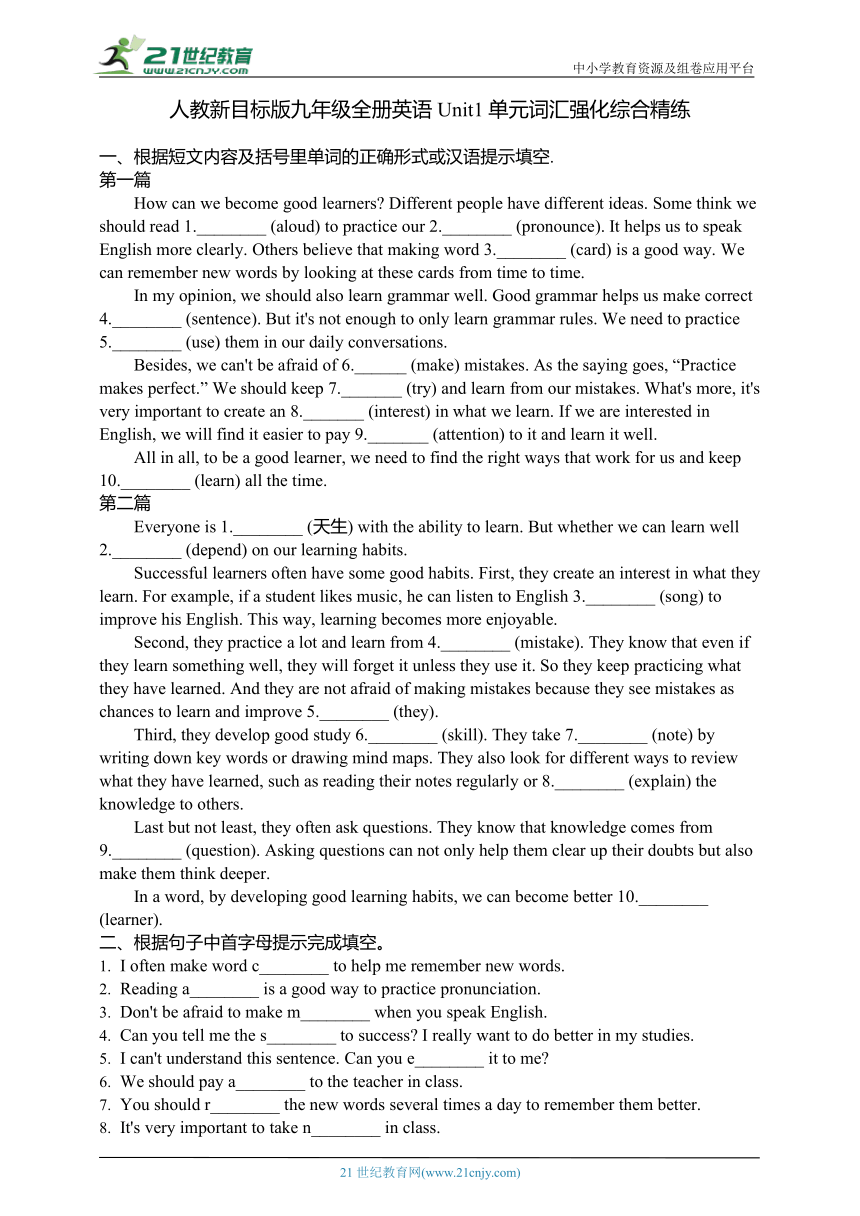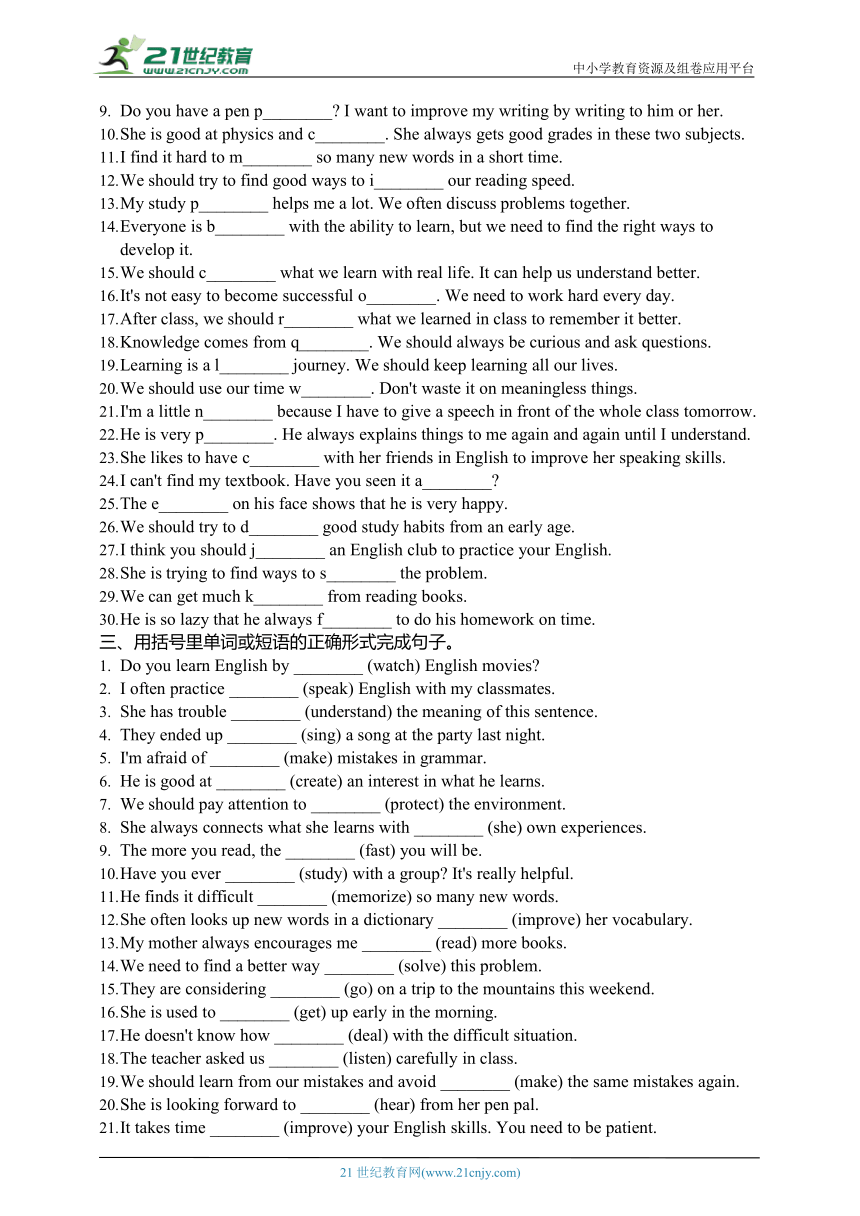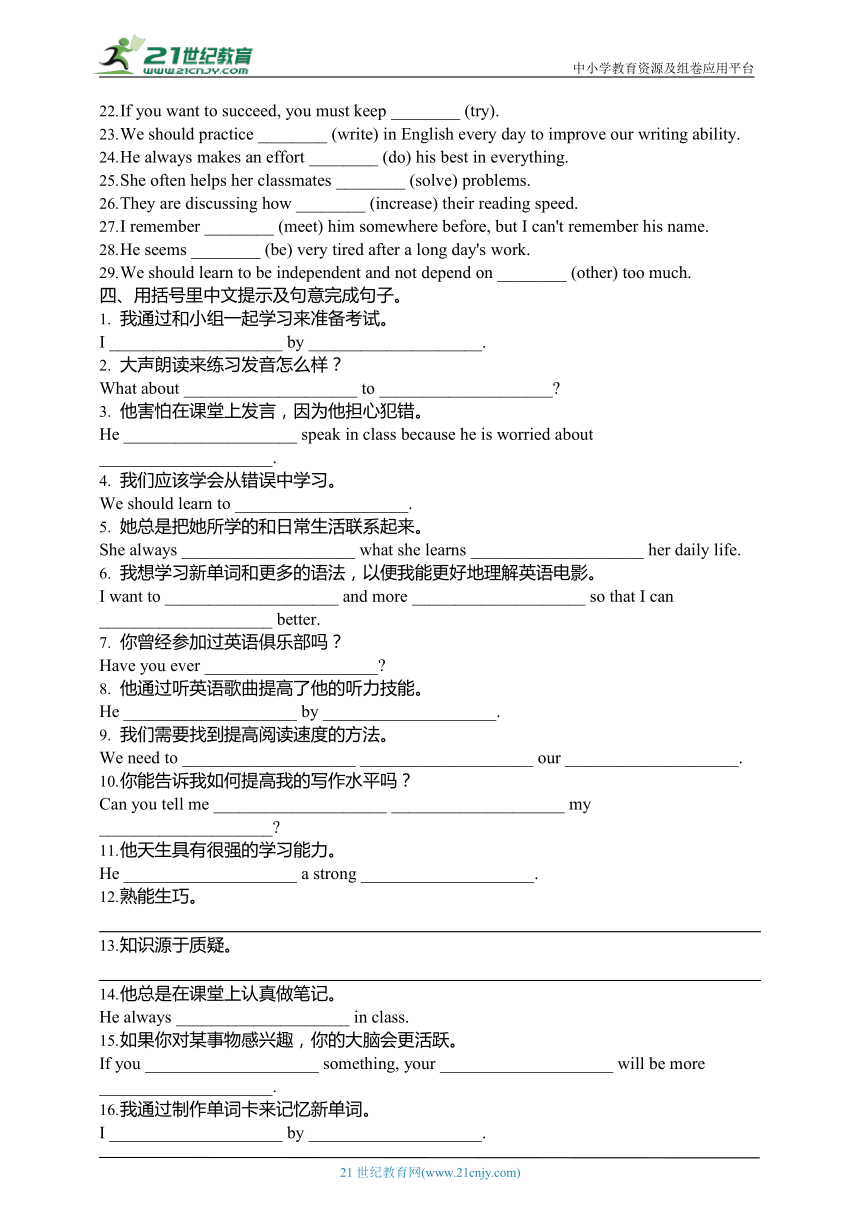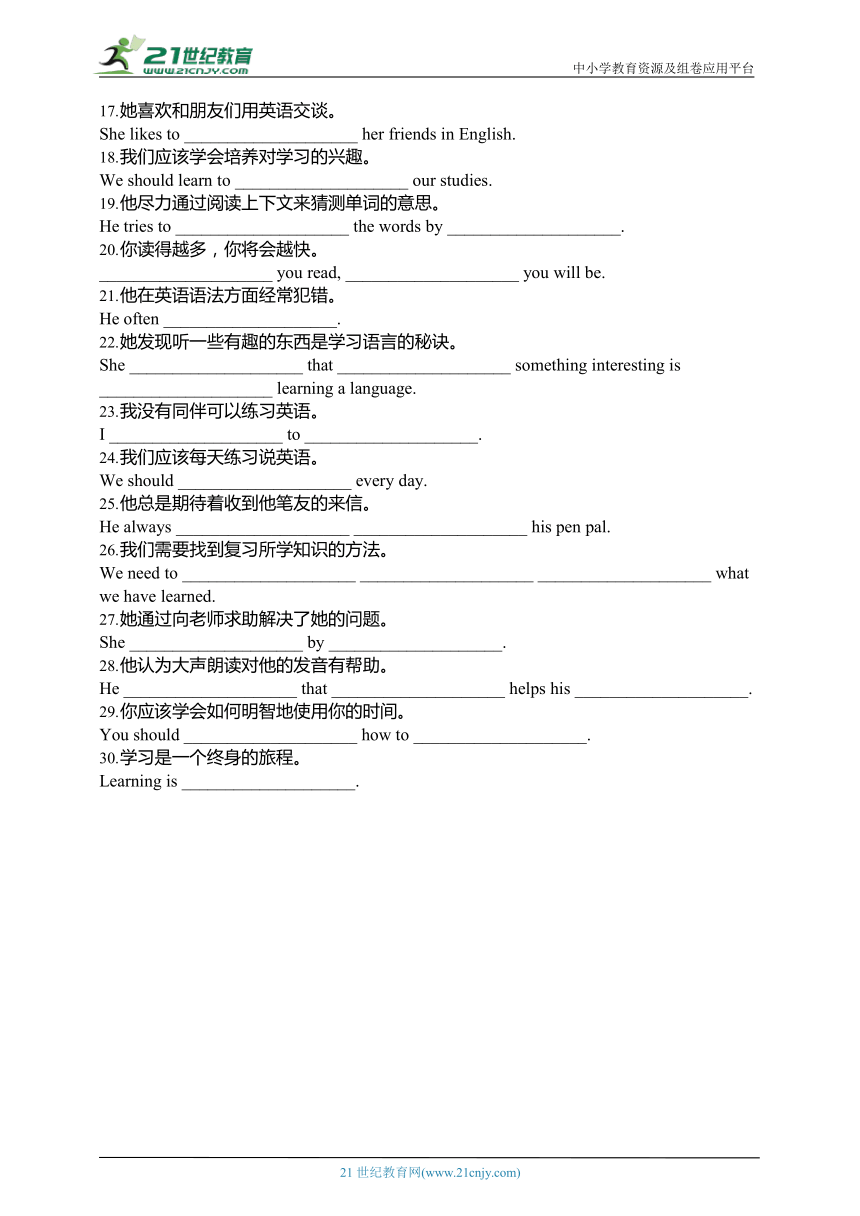Unit1单元词汇强化综合精练(含答案解析)—人教新目标版九年级全册英语Unit 1 How can we become good learners?
文档属性
| 名称 | Unit1单元词汇强化综合精练(含答案解析)—人教新目标版九年级全册英语Unit 1 How can we become good learners? |  | |
| 格式 | docx | ||
| 文件大小 | 57.6KB | ||
| 资源类型 | 试卷 | ||
| 版本资源 | 人教新目标(Go for it)版 | ||
| 科目 | 英语 | ||
| 更新时间 | 2025-08-11 14:46:32 | ||
图片预览




文档简介
中小学教育资源及组卷应用平台
人教新目标版九年级全册英语Unit1单元词汇强化综合精练
一、根据短文内容及括号里单词的正确形式或汉语提示填空.
第一篇
How can we become good learners Different people have different ideas. Some think we should read 1.________ (aloud) to practice our 2.________ (pronounce). It helps us to speak English more clearly. Others believe that making word 3.________ (card) is a good way. We can remember new words by looking at these cards from time to time.
In my opinion, we should also learn grammar well. Good grammar helps us make correct 4.________ (sentence). But it's not enough to only learn grammar rules. We need to practice 5.________ (use) them in our daily conversations.
Besides, we can't be afraid of 6.______ (make) mistakes. As the saying goes, “Practice makes perfect.” We should keep 7._______ (try) and learn from our mistakes. What's more, it's very important to create an 8._______ (interest) in what we learn. If we are interested in English, we will find it easier to pay 9._______ (attention) to it and learn it well.
All in all, to be a good learner, we need to find the right ways that work for us and keep 10.________ (learn) all the time.
第二篇
Everyone is 1.________ (天生) with the ability to learn. But whether we can learn well 2.________ (depend) on our learning habits.
Successful learners often have some good habits. First, they create an interest in what they learn. For example, if a student likes music, he can listen to English 3.________ (song) to improve his English. This way, learning becomes more enjoyable.
Second, they practice a lot and learn from 4.________ (mistake). They know that even if they learn something well, they will forget it unless they use it. So they keep practicing what they have learned. And they are not afraid of making mistakes because they see mistakes as chances to learn and improve 5.________ (they).
Third, they develop good study 6.________ (skill). They take 7.________ (note) by writing down key words or drawing mind maps. They also look for different ways to review what they have learned, such as reading their notes regularly or 8.________ (explain) the knowledge to others.
Last but not least, they often ask questions. They know that knowledge comes from 9.________ (question). Asking questions can not only help them clear up their doubts but also make them think deeper.
In a word, by developing good learning habits, we can become better 10.________ (learner).
二、根据句子中首字母提示完成填空。
I often make word c________ to help me remember new words.
Reading a________ is a good way to practice pronunciation.
Don't be afraid to make m________ when you speak English.
Can you tell me the s________ to success I really want to do better in my studies.
I can't understand this sentence. Can you e________ it to me
We should pay a________ to the teacher in class.
You should r________ the new words several times a day to remember them better.
It's very important to take n________ in class.
Do you have a pen p________ I want to improve my writing by writing to him or her.
She is good at physics and c________. She always gets good grades in these two subjects.
I find it hard to m________ so many new words in a short time.
We should try to find good ways to i________ our reading speed.
My study p________ helps me a lot. We often discuss problems together.
Everyone is b________ with the ability to learn, but we need to find the right ways to develop it.
We should c________ what we learn with real life. It can help us understand better.
It's not easy to become successful o________. We need to work hard every day.
After class, we should r________ what we learned in class to remember it better.
Knowledge comes from q________. We should always be curious and ask questions.
Learning is a l________ journey. We should keep learning all our lives.
We should use our time w________. Don't waste it on meaningless things.
I'm a little n________ because I have to give a speech in front of the whole class tomorrow.
He is very p________. He always explains things to me again and again until I understand.
She likes to have c________ with her friends in English to improve her speaking skills.
I can't find my textbook. Have you seen it a________
The e________ on his face shows that he is very happy.
We should try to d________ good study habits from an early age.
I think you should j________ an English club to practice your English.
She is trying to find ways to s________ the problem.
We can get much k________ from reading books.
He is so lazy that he always f________ to do his homework on time.
三、用括号里单词或短语的正确形式完成句子。
Do you learn English by ________ (watch) English movies
I often practice ________ (speak) English with my classmates.
She has trouble ________ (understand) the meaning of this sentence.
They ended up ________ (sing) a song at the party last night.
I'm afraid of ________ (make) mistakes in grammar.
He is good at ________ (create) an interest in what he learns.
We should pay attention to ________ (protect) the environment.
She always connects what she learns with ________ (she) own experiences.
The more you read, the ________ (fast) you will be.
Have you ever ________ (study) with a group It's really helpful.
He finds it difficult ________ (memorize) so many new words.
She often looks up new words in a dictionary ________ (improve) her vocabulary.
My mother always encourages me ________ (read) more books.
We need to find a better way ________ (solve) this problem.
They are considering ________ (go) on a trip to the mountains this weekend.
She is used to ________ (get) up early in the morning.
He doesn't know how ________ (deal) with the difficult situation.
The teacher asked us ________ (listen) carefully in class.
We should learn from our mistakes and avoid ________ (make) the same mistakes again.
She is looking forward to ________ (hear) from her pen pal.
It takes time ________ (improve) your English skills. You need to be patient.
If you want to succeed, you must keep ________ (try).
We should practice ________ (write) in English every day to improve our writing ability.
He always makes an effort ________ (do) his best in everything.
She often helps her classmates ________ (solve) problems.
They are discussing how ________ (increase) their reading speed.
I remember ________ (meet) him somewhere before, but I can't remember his name.
He seems ________ (be) very tired after a long day's work.
We should learn to be independent and not depend on ________ (other) too much.
四、用括号里中文提示及句意完成句子。
我通过和小组一起学习来准备考试。
I ____________________ by ____________________.
大声朗读来练习发音怎么样?
What about ____________________ to ____________________
他害怕在课堂上发言,因为他担心犯错。
He ____________________ speak in class because he is worried about ____________________.
我们应该学会从错误中学习。
We should learn to ____________________.
她总是把她所学的和日常生活联系起来。
She always ____________________ what she learns ____________________ her daily life.
我想学习新单词和更多的语法,以便我能更好地理解英语电影。
I want to ____________________ and more ____________________ so that I can ____________________ better.
你曾经参加过英语俱乐部吗?
Have you ever ____________________
他通过听英语歌曲提高了他的听力技能。
He ____________________ by ____________________.
我们需要找到提高阅读速度的方法。
We need to ____________________ ____________________ our ____________________.
你能告诉我如何提高我的写作水平吗?
Can you tell me ____________________ ____________________ my ____________________
他天生具有很强的学习能力。
He ____________________ a strong ____________________.
熟能生巧。
知识源于质疑。
他总是在课堂上认真做笔记。
He always ____________________ in class.
如果你对某事物感兴趣,你的大脑会更活跃。
If you ____________________ something, your ____________________ will be more ____________________.
我通过制作单词卡来记忆新单词。
I ____________________ by ____________________.
她喜欢和朋友们用英语交谈。
She likes to ____________________ her friends in English.
我们应该学会培养对学习的兴趣。
We should learn to ____________________ our studies.
他尽力通过阅读上下文来猜测单词的意思。
He tries to ____________________ the words by ____________________.
你读得越多,你将会越快。
____________________ you read, ____________________ you will be.
他在英语语法方面经常犯错。
He often ____________________.
她发现听一些有趣的东西是学习语言的秘诀。
She ____________________ that ____________________ something interesting is ____________________ learning a language.
我没有同伴可以练习英语。
I ____________________ to ____________________.
我们应该每天练习说英语。
We should ____________________ every day.
他总是期待着收到他笔友的来信。
He always ____________________ ____________________ his pen pal.
我们需要找到复习所学知识的方法。
We need to ____________________ ____________________ ____________________ what we have learned.
她通过向老师求助解决了她的问题。
She ____________________ by ____________________.
他认为大声朗读对他的发音有帮助。
He ____________________ that ____________________ helps his ____________________.
你应该学会如何明智地使用你的时间。
You should ____________________ how to ____________________.
学习是一个终身的旅程。
Learning is ____________________.
答案解析:
一、
第一篇
aloud解析:此处需用副词修饰动词“read”,“aloud”是副词,意为“大声地”,符合“大声朗读”的语境。
pronunciation解析:形容词性物主代词“our”后需接名词,“pronounce”的名词形式是“pronunciation”(发音)。
cards解析:“word cards”(单词卡)是固定搭配,且通常用复数形式表示泛指。
sentences解析:“make sentences”(造句)是常用短语,“sentence”为可数名词,此处用复数表示泛指。
using解析:“practice doing sth.”(练习做某事)是固定用法,故“use”需用动名词形式“using”。
making解析:“be afraid of doing sth.”(害怕做某事),“of”是介词,后接动名词“making”。
trying解析:“keep doing sth.”(坚持做某事),故“try”用动名词“trying”。
interest解析:“create an interest in...”(培养对……的兴趣),“interest”此处为名词“兴趣”。
attention解析:“pay attention to...”(关注……)是固定短语,“attention”为不可数名词。
learning解析:“keep doing sth.”(一直做某事),“learn”的动名词是“learning”。
第二篇
born解析:“be born with”(天生具有)是固定搭配,“born”为过去分词作表语。
depends解析:主语“whether we can learn well”是从句,视为单数,谓语动词用第三人称单数“depends”。
songs解析:“English songs”(英文歌曲)为泛指,用复数形式。
mistakes解析:“learn from mistakes”(从错误中学习),“mistake”是可数名词,用复数表泛指。
themselves解析:此处需用反身代词作宾语,“they”的反身代词是“themselves”(他们自己)。
skills解析:“study skills”(学习技能),“skill”为可数名词,用复数表泛指。
notes解析:“take notes”(做笔记)是固定短语,用复数形式。
explaining解析:“such as”后接动名词形式,与“reading”并列,故“explain”用“explaining”。
questions解析:“come from questions”(源于质疑),“question”用复数表泛指。
learners解析:“better”修饰名词,主语是“we”,故“learner”用复数“learners”。
二、根据句子中首字母提示完成填空
cards(解析:“word cards”意为“单词卡”)
aloud(解析:“read aloud”意为“大声朗读”)
mistakes(解析:“make mistakes”意为“犯错”)
secret(解析:“the secret to success”意为“成功的秘诀”)
explain(解析:句意为“你能给我解释一下吗?”)
attention(解析:“pay attention to”意为“关注”)
review(解析:句意为“你应该每天复习新单词”)
notes(解析:“take notes”意为“做笔记”)
pal(解析:“pen pal”意为“笔友”)
chemistry(解析:与“physics”并列的理科科目,结合首字母应为“chemistry”)
memorize(解析:句意为“短时间内记住这么多单词很难”)
increase(解析:“improve reading speed”可替换为“increase reading speed”)
partner(解析:句意为“我的学习伙伴帮了我很多”)
born(解析:“be born with”意为“天生具有”)
connect(解析:“connect...with...”意为“把……和……联系起来”)
overnight(解析:句意为“一夜成名并不容易”)
review(解析:句意为“课后我们应该复习课堂内容”)
questions(解析:“Knowledge comes from questions”是固定表达)
lifelong(解析:“a lifelong journey”意为“终身旅程”)
wisely(解析:句意为“我们应该明智地利用时间”)
nervous(解析:句意为“我有点紧张,因为明天要在全班面前演讲”)
patient(解析:句意为“他很有耐心,总是反复解释直到我明白”)
conversations(解析:“have conversations with”意为“与……交谈”)
anywhere(解析:句意为“你在任何地方见过我的课本吗?”)
expression(解析:“the expression on one's face”意为“某人脸上的表情”)
develop(解析:“develop good study habits”意为“培养良好的学习习惯”)
join(解析:“join an English club”意为“加入英语俱乐部”)
solve(解析:句意为“她在努力找到解决问题的方法”)
knowledge(解析:句意为“我们能从书中获得很多知识”)
forgets(解析:句意为“他很懒,总是忘记按时做作业”,主语是第三人称单数,故用“forgets”)
三、用括号里单词或短语的正确形式完成句子
watching解析:“by doing sth.”(通过做某事),“watch”的动名词是“watching”。
speaking解析:“practice doing sth.”(练习做某事),“speak”的动名词是“speaking”。
understanding解析:“have trouble doing sth.”(做某事有困难),“understand”的动名词是“understanding”。
singing解析:“end up doing sth.”(以做某事结束),“sing”的动名词是“singing”。
making解析:“be afraid of doing sth.”(害怕做某事),“make”的动名词是“making”。
creating解析:“be good at doing sth.”(擅长做某事),“create”的动名词是“creating”。
protecting解析:“pay attention to doing sth.”(关注做某事),“protect”的动名词是“protecting”。
her解析:“own experiences”前需用形容词性物主代词,“she”的形容词性物主代词是“her”。
faster解析:“the+比较级,the+比较级”(越……,越……),“fast”的比较级是“faster”。
studied解析:“Have you ever+过去分词”(现在完成时),“study”的过去分词是“studied”。
to memorize解析:“find it+形容词+to do sth.”(发现做某事……),用不定式“to memorize”。
to improve解析:此处用不定式表目的,“to improve”意为“为了提高”。
to read解析:“encourage sb. to do sth.”(鼓励某人做某事),用不定式“to read”。
to solve解析:“a way to do sth.”(做某事的方法),用不定式“to solve”。
going解析:“consider doing sth.”(考虑做某事),“go”的动名词是“going”。
getting解析:“be used to doing sth.”(习惯于做某事),“get”的动名词是“getting”。
to deal解析:“how to do sth.”(如何做某事),用不定式“to deal”。
to listen解析:“ask sb. to do sth.”(要求某人做某事),用不定式“to listen”。
making解析:“avoid doing sth.”(避免做某事),“make”的动名词是“making”。
hearing解析:“look forward to doing sth.”(期待做某事),“hear”的动名词是“hearing”。
to improve解析:“It takes time to do sth.”(做某事需要时间),用不定式“to improve”。
trying解析:“keep doing sth.”(坚持做某事),“try”的动名词是“trying”。
writing解析:“practice doing sth.”(练习做某事),“write”的动名词是“writing”。
to do解析:“make an effort to do sth.”(努力做某事),用不定式“to do”。
(to) solve解析:“help sb. (to) do sth.”(帮助某人做某事),“to”可省略。
to increase解析:“how to do sth.”(如何做某事),用不定式“to increase”。
meeting解析:“remember doing sth.”(记得做过某事),“meet”的动名词是“meeting”。
to be解析:“seem to be...”(似乎……),用不定式“to be”。
others解析:“depend on others”(依赖他人),“others”意为“其他人”。
四、用括号里中文提示及句意完成句子
prepare for exams;studying with a group解析:“准备考试”译为“prepare for exams”;“和小组一起学习”译为“studying with a group”,“by”后接动名词。
reading aloud;practice pronunciation解析:“大声朗读”译为“reading aloud”(“What about+动名词”);“练习发音”译为“practice pronunciation”。
is afraid to;making mistakes解析:“害怕做某事”译为“be afraid to do sth.”;“犯错”译为“making mistakes”(“about”后接动名词)。
learn from mistakes解析:“从错误中学习”直接译为“learn from mistakes”。
connects;with解析:“把……和……联系起来”译为“connect...with...”,主语是第三人称单数,故“connect”用“connects”。
learn new words;grammar;understand English movies解析:“学习新单词”译为“learn new words”;“语法”译为“grammar”;“理解英语电影”译为“understand English movies”。
joined an English club解析:“参加英语俱乐部”译为“join an English club”,现在完成时中“join”用过去分词“joined”。
improved his listening skills;listening to English songs解析:“提高听力技能”译为“improved his listening skills”;“听英语歌曲”译为“listening to English songs”(“by”后接动名词)。
find ways to increase;reading speed解析:“找到方法提高”译为“find ways to increase”;“阅读速度”译为“reading speed”。
how to improve;writing解析:“如何提高”译为“how to improve”;“写作水平”译为“writing”。
is born with;ability to learn解析:“天生具有”译为“is born with”;“学习能力”译为“ability to learn”。
Practice makes perfect.解析:固定谚语,直接翻译。
Knowledge comes from questioning.解析:固定表达,“质疑”用动名词“questioning”。
takes careful notes解析:“认真做笔记”译为“takes careful notes”,主语是第三人称单数,“take”用“takes”。
are interested in;brain;active解析:“对……感兴趣”译为“are interested in”;“大脑”译为“brain”;“活跃”译为“active”。
memorize new words;making word cards解析:“记忆新单词”译为“memorize new words”;“制作单词卡”译为“making word cards”(“by”后接动名词)。
have conversations with解析:“和……交谈”译为“have conversations with”。
develop an interest in解析:“培养对……的兴趣”译为“develop an interest in”。
guess the meaning of;reading the context解析:“猜测单词的意思”译为“guess the meaning of”;“阅读上下文”译为“reading the context”(“by”后接动名词)。
The more;the faster解析:“the+比较级,the+比较级”结构,“越多……越快……”译为“The more...the faster...”。
makes mistakes in English grammar解析:“在英语语法方面犯错”译为“makes mistakes in English grammar”,主语是第三人称单数,“make”用“makes”。
finds;listening to;the secret to解析:“发现”译为“finds”(主语是第三人称单数);“听”译为“listening to”(动名词作主语);“……的秘诀”译为“the secret to”。
have no partner;practice English with解析:“没有同伴”译为“have no partner”;“练习英语”译为“practice English with”(不定式作后置定语)。
practice speaking English解析:“练习说英语”译为“practice speaking English”(“practice+动名词”)。
looks forward to hearing from解析:“期待收到……的来信”译为“looks forward to hearing from”,主语是第三人称单数,“look”用“looks”。
find ways to review解析:“找到复习……的方法”译为“find ways to review”。
solved her problem;asking the teacher for help解析:“解决她的问题”译为“solved her problem”;“向老师求助”译为“asking the teacher for help”(“by”后接动名词)。
thinks;reading aloud;pronunciation解析:“认为”译为“thinks”(主语是第三人称单数);“大声朗读”译为“reading aloud”(动名词作主语);“发音”译为“pronunciation”。
learn;use your time wisely解析:“学会如何……”译为“learn how to...”;“明智地使用你的时间”译为“use your time wisely”。
a lifelong journey解析:“终身的旅程”译为“a lifelong journey”。
21世纪教育网 www.21cnjy.com 精品试卷·第 2 页 (共 2 页)
21世纪教育网(www.21cnjy.com)
人教新目标版九年级全册英语Unit1单元词汇强化综合精练
一、根据短文内容及括号里单词的正确形式或汉语提示填空.
第一篇
How can we become good learners Different people have different ideas. Some think we should read 1.________ (aloud) to practice our 2.________ (pronounce). It helps us to speak English more clearly. Others believe that making word 3.________ (card) is a good way. We can remember new words by looking at these cards from time to time.
In my opinion, we should also learn grammar well. Good grammar helps us make correct 4.________ (sentence). But it's not enough to only learn grammar rules. We need to practice 5.________ (use) them in our daily conversations.
Besides, we can't be afraid of 6.______ (make) mistakes. As the saying goes, “Practice makes perfect.” We should keep 7._______ (try) and learn from our mistakes. What's more, it's very important to create an 8._______ (interest) in what we learn. If we are interested in English, we will find it easier to pay 9._______ (attention) to it and learn it well.
All in all, to be a good learner, we need to find the right ways that work for us and keep 10.________ (learn) all the time.
第二篇
Everyone is 1.________ (天生) with the ability to learn. But whether we can learn well 2.________ (depend) on our learning habits.
Successful learners often have some good habits. First, they create an interest in what they learn. For example, if a student likes music, he can listen to English 3.________ (song) to improve his English. This way, learning becomes more enjoyable.
Second, they practice a lot and learn from 4.________ (mistake). They know that even if they learn something well, they will forget it unless they use it. So they keep practicing what they have learned. And they are not afraid of making mistakes because they see mistakes as chances to learn and improve 5.________ (they).
Third, they develop good study 6.________ (skill). They take 7.________ (note) by writing down key words or drawing mind maps. They also look for different ways to review what they have learned, such as reading their notes regularly or 8.________ (explain) the knowledge to others.
Last but not least, they often ask questions. They know that knowledge comes from 9.________ (question). Asking questions can not only help them clear up their doubts but also make them think deeper.
In a word, by developing good learning habits, we can become better 10.________ (learner).
二、根据句子中首字母提示完成填空。
I often make word c________ to help me remember new words.
Reading a________ is a good way to practice pronunciation.
Don't be afraid to make m________ when you speak English.
Can you tell me the s________ to success I really want to do better in my studies.
I can't understand this sentence. Can you e________ it to me
We should pay a________ to the teacher in class.
You should r________ the new words several times a day to remember them better.
It's very important to take n________ in class.
Do you have a pen p________ I want to improve my writing by writing to him or her.
She is good at physics and c________. She always gets good grades in these two subjects.
I find it hard to m________ so many new words in a short time.
We should try to find good ways to i________ our reading speed.
My study p________ helps me a lot. We often discuss problems together.
Everyone is b________ with the ability to learn, but we need to find the right ways to develop it.
We should c________ what we learn with real life. It can help us understand better.
It's not easy to become successful o________. We need to work hard every day.
After class, we should r________ what we learned in class to remember it better.
Knowledge comes from q________. We should always be curious and ask questions.
Learning is a l________ journey. We should keep learning all our lives.
We should use our time w________. Don't waste it on meaningless things.
I'm a little n________ because I have to give a speech in front of the whole class tomorrow.
He is very p________. He always explains things to me again and again until I understand.
She likes to have c________ with her friends in English to improve her speaking skills.
I can't find my textbook. Have you seen it a________
The e________ on his face shows that he is very happy.
We should try to d________ good study habits from an early age.
I think you should j________ an English club to practice your English.
She is trying to find ways to s________ the problem.
We can get much k________ from reading books.
He is so lazy that he always f________ to do his homework on time.
三、用括号里单词或短语的正确形式完成句子。
Do you learn English by ________ (watch) English movies
I often practice ________ (speak) English with my classmates.
She has trouble ________ (understand) the meaning of this sentence.
They ended up ________ (sing) a song at the party last night.
I'm afraid of ________ (make) mistakes in grammar.
He is good at ________ (create) an interest in what he learns.
We should pay attention to ________ (protect) the environment.
She always connects what she learns with ________ (she) own experiences.
The more you read, the ________ (fast) you will be.
Have you ever ________ (study) with a group It's really helpful.
He finds it difficult ________ (memorize) so many new words.
She often looks up new words in a dictionary ________ (improve) her vocabulary.
My mother always encourages me ________ (read) more books.
We need to find a better way ________ (solve) this problem.
They are considering ________ (go) on a trip to the mountains this weekend.
She is used to ________ (get) up early in the morning.
He doesn't know how ________ (deal) with the difficult situation.
The teacher asked us ________ (listen) carefully in class.
We should learn from our mistakes and avoid ________ (make) the same mistakes again.
She is looking forward to ________ (hear) from her pen pal.
It takes time ________ (improve) your English skills. You need to be patient.
If you want to succeed, you must keep ________ (try).
We should practice ________ (write) in English every day to improve our writing ability.
He always makes an effort ________ (do) his best in everything.
She often helps her classmates ________ (solve) problems.
They are discussing how ________ (increase) their reading speed.
I remember ________ (meet) him somewhere before, but I can't remember his name.
He seems ________ (be) very tired after a long day's work.
We should learn to be independent and not depend on ________ (other) too much.
四、用括号里中文提示及句意完成句子。
我通过和小组一起学习来准备考试。
I ____________________ by ____________________.
大声朗读来练习发音怎么样?
What about ____________________ to ____________________
他害怕在课堂上发言,因为他担心犯错。
He ____________________ speak in class because he is worried about ____________________.
我们应该学会从错误中学习。
We should learn to ____________________.
她总是把她所学的和日常生活联系起来。
She always ____________________ what she learns ____________________ her daily life.
我想学习新单词和更多的语法,以便我能更好地理解英语电影。
I want to ____________________ and more ____________________ so that I can ____________________ better.
你曾经参加过英语俱乐部吗?
Have you ever ____________________
他通过听英语歌曲提高了他的听力技能。
He ____________________ by ____________________.
我们需要找到提高阅读速度的方法。
We need to ____________________ ____________________ our ____________________.
你能告诉我如何提高我的写作水平吗?
Can you tell me ____________________ ____________________ my ____________________
他天生具有很强的学习能力。
He ____________________ a strong ____________________.
熟能生巧。
知识源于质疑。
他总是在课堂上认真做笔记。
He always ____________________ in class.
如果你对某事物感兴趣,你的大脑会更活跃。
If you ____________________ something, your ____________________ will be more ____________________.
我通过制作单词卡来记忆新单词。
I ____________________ by ____________________.
她喜欢和朋友们用英语交谈。
She likes to ____________________ her friends in English.
我们应该学会培养对学习的兴趣。
We should learn to ____________________ our studies.
他尽力通过阅读上下文来猜测单词的意思。
He tries to ____________________ the words by ____________________.
你读得越多,你将会越快。
____________________ you read, ____________________ you will be.
他在英语语法方面经常犯错。
He often ____________________.
她发现听一些有趣的东西是学习语言的秘诀。
She ____________________ that ____________________ something interesting is ____________________ learning a language.
我没有同伴可以练习英语。
I ____________________ to ____________________.
我们应该每天练习说英语。
We should ____________________ every day.
他总是期待着收到他笔友的来信。
He always ____________________ ____________________ his pen pal.
我们需要找到复习所学知识的方法。
We need to ____________________ ____________________ ____________________ what we have learned.
她通过向老师求助解决了她的问题。
She ____________________ by ____________________.
他认为大声朗读对他的发音有帮助。
He ____________________ that ____________________ helps his ____________________.
你应该学会如何明智地使用你的时间。
You should ____________________ how to ____________________.
学习是一个终身的旅程。
Learning is ____________________.
答案解析:
一、
第一篇
aloud解析:此处需用副词修饰动词“read”,“aloud”是副词,意为“大声地”,符合“大声朗读”的语境。
pronunciation解析:形容词性物主代词“our”后需接名词,“pronounce”的名词形式是“pronunciation”(发音)。
cards解析:“word cards”(单词卡)是固定搭配,且通常用复数形式表示泛指。
sentences解析:“make sentences”(造句)是常用短语,“sentence”为可数名词,此处用复数表示泛指。
using解析:“practice doing sth.”(练习做某事)是固定用法,故“use”需用动名词形式“using”。
making解析:“be afraid of doing sth.”(害怕做某事),“of”是介词,后接动名词“making”。
trying解析:“keep doing sth.”(坚持做某事),故“try”用动名词“trying”。
interest解析:“create an interest in...”(培养对……的兴趣),“interest”此处为名词“兴趣”。
attention解析:“pay attention to...”(关注……)是固定短语,“attention”为不可数名词。
learning解析:“keep doing sth.”(一直做某事),“learn”的动名词是“learning”。
第二篇
born解析:“be born with”(天生具有)是固定搭配,“born”为过去分词作表语。
depends解析:主语“whether we can learn well”是从句,视为单数,谓语动词用第三人称单数“depends”。
songs解析:“English songs”(英文歌曲)为泛指,用复数形式。
mistakes解析:“learn from mistakes”(从错误中学习),“mistake”是可数名词,用复数表泛指。
themselves解析:此处需用反身代词作宾语,“they”的反身代词是“themselves”(他们自己)。
skills解析:“study skills”(学习技能),“skill”为可数名词,用复数表泛指。
notes解析:“take notes”(做笔记)是固定短语,用复数形式。
explaining解析:“such as”后接动名词形式,与“reading”并列,故“explain”用“explaining”。
questions解析:“come from questions”(源于质疑),“question”用复数表泛指。
learners解析:“better”修饰名词,主语是“we”,故“learner”用复数“learners”。
二、根据句子中首字母提示完成填空
cards(解析:“word cards”意为“单词卡”)
aloud(解析:“read aloud”意为“大声朗读”)
mistakes(解析:“make mistakes”意为“犯错”)
secret(解析:“the secret to success”意为“成功的秘诀”)
explain(解析:句意为“你能给我解释一下吗?”)
attention(解析:“pay attention to”意为“关注”)
review(解析:句意为“你应该每天复习新单词”)
notes(解析:“take notes”意为“做笔记”)
pal(解析:“pen pal”意为“笔友”)
chemistry(解析:与“physics”并列的理科科目,结合首字母应为“chemistry”)
memorize(解析:句意为“短时间内记住这么多单词很难”)
increase(解析:“improve reading speed”可替换为“increase reading speed”)
partner(解析:句意为“我的学习伙伴帮了我很多”)
born(解析:“be born with”意为“天生具有”)
connect(解析:“connect...with...”意为“把……和……联系起来”)
overnight(解析:句意为“一夜成名并不容易”)
review(解析:句意为“课后我们应该复习课堂内容”)
questions(解析:“Knowledge comes from questions”是固定表达)
lifelong(解析:“a lifelong journey”意为“终身旅程”)
wisely(解析:句意为“我们应该明智地利用时间”)
nervous(解析:句意为“我有点紧张,因为明天要在全班面前演讲”)
patient(解析:句意为“他很有耐心,总是反复解释直到我明白”)
conversations(解析:“have conversations with”意为“与……交谈”)
anywhere(解析:句意为“你在任何地方见过我的课本吗?”)
expression(解析:“the expression on one's face”意为“某人脸上的表情”)
develop(解析:“develop good study habits”意为“培养良好的学习习惯”)
join(解析:“join an English club”意为“加入英语俱乐部”)
solve(解析:句意为“她在努力找到解决问题的方法”)
knowledge(解析:句意为“我们能从书中获得很多知识”)
forgets(解析:句意为“他很懒,总是忘记按时做作业”,主语是第三人称单数,故用“forgets”)
三、用括号里单词或短语的正确形式完成句子
watching解析:“by doing sth.”(通过做某事),“watch”的动名词是“watching”。
speaking解析:“practice doing sth.”(练习做某事),“speak”的动名词是“speaking”。
understanding解析:“have trouble doing sth.”(做某事有困难),“understand”的动名词是“understanding”。
singing解析:“end up doing sth.”(以做某事结束),“sing”的动名词是“singing”。
making解析:“be afraid of doing sth.”(害怕做某事),“make”的动名词是“making”。
creating解析:“be good at doing sth.”(擅长做某事),“create”的动名词是“creating”。
protecting解析:“pay attention to doing sth.”(关注做某事),“protect”的动名词是“protecting”。
her解析:“own experiences”前需用形容词性物主代词,“she”的形容词性物主代词是“her”。
faster解析:“the+比较级,the+比较级”(越……,越……),“fast”的比较级是“faster”。
studied解析:“Have you ever+过去分词”(现在完成时),“study”的过去分词是“studied”。
to memorize解析:“find it+形容词+to do sth.”(发现做某事……),用不定式“to memorize”。
to improve解析:此处用不定式表目的,“to improve”意为“为了提高”。
to read解析:“encourage sb. to do sth.”(鼓励某人做某事),用不定式“to read”。
to solve解析:“a way to do sth.”(做某事的方法),用不定式“to solve”。
going解析:“consider doing sth.”(考虑做某事),“go”的动名词是“going”。
getting解析:“be used to doing sth.”(习惯于做某事),“get”的动名词是“getting”。
to deal解析:“how to do sth.”(如何做某事),用不定式“to deal”。
to listen解析:“ask sb. to do sth.”(要求某人做某事),用不定式“to listen”。
making解析:“avoid doing sth.”(避免做某事),“make”的动名词是“making”。
hearing解析:“look forward to doing sth.”(期待做某事),“hear”的动名词是“hearing”。
to improve解析:“It takes time to do sth.”(做某事需要时间),用不定式“to improve”。
trying解析:“keep doing sth.”(坚持做某事),“try”的动名词是“trying”。
writing解析:“practice doing sth.”(练习做某事),“write”的动名词是“writing”。
to do解析:“make an effort to do sth.”(努力做某事),用不定式“to do”。
(to) solve解析:“help sb. (to) do sth.”(帮助某人做某事),“to”可省略。
to increase解析:“how to do sth.”(如何做某事),用不定式“to increase”。
meeting解析:“remember doing sth.”(记得做过某事),“meet”的动名词是“meeting”。
to be解析:“seem to be...”(似乎……),用不定式“to be”。
others解析:“depend on others”(依赖他人),“others”意为“其他人”。
四、用括号里中文提示及句意完成句子
prepare for exams;studying with a group解析:“准备考试”译为“prepare for exams”;“和小组一起学习”译为“studying with a group”,“by”后接动名词。
reading aloud;practice pronunciation解析:“大声朗读”译为“reading aloud”(“What about+动名词”);“练习发音”译为“practice pronunciation”。
is afraid to;making mistakes解析:“害怕做某事”译为“be afraid to do sth.”;“犯错”译为“making mistakes”(“about”后接动名词)。
learn from mistakes解析:“从错误中学习”直接译为“learn from mistakes”。
connects;with解析:“把……和……联系起来”译为“connect...with...”,主语是第三人称单数,故“connect”用“connects”。
learn new words;grammar;understand English movies解析:“学习新单词”译为“learn new words”;“语法”译为“grammar”;“理解英语电影”译为“understand English movies”。
joined an English club解析:“参加英语俱乐部”译为“join an English club”,现在完成时中“join”用过去分词“joined”。
improved his listening skills;listening to English songs解析:“提高听力技能”译为“improved his listening skills”;“听英语歌曲”译为“listening to English songs”(“by”后接动名词)。
find ways to increase;reading speed解析:“找到方法提高”译为“find ways to increase”;“阅读速度”译为“reading speed”。
how to improve;writing解析:“如何提高”译为“how to improve”;“写作水平”译为“writing”。
is born with;ability to learn解析:“天生具有”译为“is born with”;“学习能力”译为“ability to learn”。
Practice makes perfect.解析:固定谚语,直接翻译。
Knowledge comes from questioning.解析:固定表达,“质疑”用动名词“questioning”。
takes careful notes解析:“认真做笔记”译为“takes careful notes”,主语是第三人称单数,“take”用“takes”。
are interested in;brain;active解析:“对……感兴趣”译为“are interested in”;“大脑”译为“brain”;“活跃”译为“active”。
memorize new words;making word cards解析:“记忆新单词”译为“memorize new words”;“制作单词卡”译为“making word cards”(“by”后接动名词)。
have conversations with解析:“和……交谈”译为“have conversations with”。
develop an interest in解析:“培养对……的兴趣”译为“develop an interest in”。
guess the meaning of;reading the context解析:“猜测单词的意思”译为“guess the meaning of”;“阅读上下文”译为“reading the context”(“by”后接动名词)。
The more;the faster解析:“the+比较级,the+比较级”结构,“越多……越快……”译为“The more...the faster...”。
makes mistakes in English grammar解析:“在英语语法方面犯错”译为“makes mistakes in English grammar”,主语是第三人称单数,“make”用“makes”。
finds;listening to;the secret to解析:“发现”译为“finds”(主语是第三人称单数);“听”译为“listening to”(动名词作主语);“……的秘诀”译为“the secret to”。
have no partner;practice English with解析:“没有同伴”译为“have no partner”;“练习英语”译为“practice English with”(不定式作后置定语)。
practice speaking English解析:“练习说英语”译为“practice speaking English”(“practice+动名词”)。
looks forward to hearing from解析:“期待收到……的来信”译为“looks forward to hearing from”,主语是第三人称单数,“look”用“looks”。
find ways to review解析:“找到复习……的方法”译为“find ways to review”。
solved her problem;asking the teacher for help解析:“解决她的问题”译为“solved her problem”;“向老师求助”译为“asking the teacher for help”(“by”后接动名词)。
thinks;reading aloud;pronunciation解析:“认为”译为“thinks”(主语是第三人称单数);“大声朗读”译为“reading aloud”(动名词作主语);“发音”译为“pronunciation”。
learn;use your time wisely解析:“学会如何……”译为“learn how to...”;“明智地使用你的时间”译为“use your time wisely”。
a lifelong journey解析:“终身的旅程”译为“a lifelong journey”。
21世纪教育网 www.21cnjy.com 精品试卷·第 2 页 (共 2 页)
21世纪教育网(www.21cnjy.com)
同课章节目录
- Unit 1 How can we become good learners.
- Section A
- Section B
- Unit 2 I think that mooncakes are delicious!
- Section A
- Section B
- Unit 3 Could you please tell me where the restroom
- Section A
- Section B
- Unit 4 I used to be afraid of the dark.
- Section A
- Section B
- Unit 5 What are the shirts made of?
- Section A
- Section B
- Review of Units 1-5
- Unit 6 When was it invented?
- Section A
- Section B
- Unit 7 Teenagers should be allowed to choose their
- Section A
- Section B
- Unit 8 It must belong to Carla.
- Section A
- Section B
- Unit 9 I like music that I can dance to.
- Section A
- Section B
- Unit 10 You're supposed to shake hands.
- Section A
- Section B
- Review of Units 6-10
- Unit 11 Sad movies make me cry.
- Section A
- Section B
- Unit 12 Life is full of the unexpected
- Section A
- Section B
- Unit 13 We're trying to save the earth!
- Section A
- Section B
- Unit 14 I remember meeting all of you in Grade 7.
- Section A
- Section B
- Review of Units 11-14
